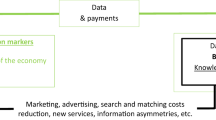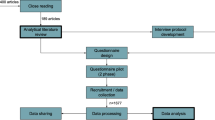Abstract
REGARDING the remarks made in NATURE of May 6 on the address of Dr. F. L. Hoffman at the American Association, it might be suggested that the organisation of facts for commercial uses is of a different order than the organisation of knowledge for the purpose of understanding the operations of Nature or of ascertaining a particular law of cause and effect. A man who collects data may, or may not, have imagination. A man may also classify facts quite mechanically according to a scheme laid down. The successful “business organiser,” however, usually has a new plan and sets others to work to collect facts for him to organise or re-organise. He knows at the start why he wants the facts and how to use them. Imagination is required by such an organiser because he has to adjust his methods not only to his data but to human beings and a changing world.
This is a preview of subscription content, access via your institution
Access options
Subscribe to this journal
Receive 51 print issues and online access
$199.00 per year
only $3.90 per issue
Buy this article
- Purchase on Springer Link
- Instant access to full article PDF
Prices may be subject to local taxes which are calculated during checkout
Similar content being viewed by others
Rights and permissions
About this article
Cite this article
LEISENRING, W. The Organisation of Knowledge. Nature 109, 715–716 (1922). https://doi.org/10.1038/109715b0
Issue Date:
DOI: https://doi.org/10.1038/109715b0
Comments
By submitting a comment you agree to abide by our Terms and Community Guidelines. If you find something abusive or that does not comply with our terms or guidelines please flag it as inappropriate.



